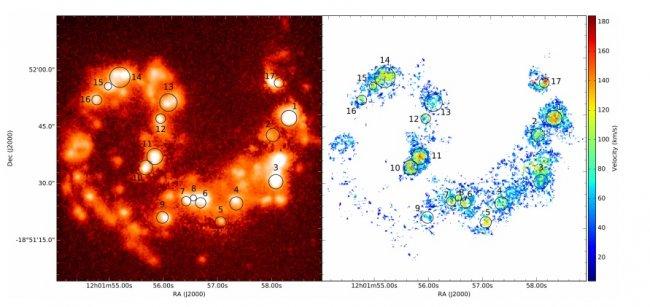It may interest you
-
 A new citizen science project launched today by the European Space Agency (ESA) and the Euclid Consortium, in collaboration with the Zooniverse platform, will enable volunteers from around the world to identify the shapes of millions of galaxies in images taken by ESA's Euclid space telescope. The aim of the initiative is to train deep AI neural networks to build the largest morphology catalogue to date. In November 2023 and May 2024, the world got its first glimpse at the quality of Euclid’s images, targeting a variety of sources, from nearby nebulas to distant clusters of galaxies. AndAdvertised on
A new citizen science project launched today by the European Space Agency (ESA) and the Euclid Consortium, in collaboration with the Zooniverse platform, will enable volunteers from around the world to identify the shapes of millions of galaxies in images taken by ESA's Euclid space telescope. The aim of the initiative is to train deep AI neural networks to build the largest morphology catalogue to date. In November 2023 and May 2024, the world got its first glimpse at the quality of Euclid’s images, targeting a variety of sources, from nearby nebulas to distant clusters of galaxies. AndAdvertised on -
 This week, CTAO Managing Director, Stuart McMuldroch, and Construction Programme Manager, Volker Heinz, traveled to the Canary Islands for a productive visit with the hosting partners at the Instituto de Astrofísica de Canarias (IAC) and colleagues from the CTAO Large-Sized Telescope (LST) Collaboration. The team was warmly welcomed at the IAC Headquarters in Tenerife by IAC Director, Valentín Martínez, marking the first official meeting between the two directors since Valentín recently assumed this role. Hosted by Ramón García López, Principal Investigator of the CTAO group at the IAC, theAdvertised on
This week, CTAO Managing Director, Stuart McMuldroch, and Construction Programme Manager, Volker Heinz, traveled to the Canary Islands for a productive visit with the hosting partners at the Instituto de Astrofísica de Canarias (IAC) and colleagues from the CTAO Large-Sized Telescope (LST) Collaboration. The team was warmly welcomed at the IAC Headquarters in Tenerife by IAC Director, Valentín Martínez, marking the first official meeting between the two directors since Valentín recently assumed this role. Hosted by Ramón García López, Principal Investigator of the CTAO group at the IAC, theAdvertised on -
 The Instituto de Astrofísica de Canarias has put itself on the frontier of astrophysical technology by developing the first integrated photonic circuit designed entirely within the Institute. This pioneering advance will permit the improvement of astronomical instruments, and the development of innovative systems for observing the universe. Astrophysical instrumentation, for both ground-based and space-based use is so specialized that often comercial systems and subsystems do not come up to the required specifications, This makes it necessary to buy high priced components or to delegateAdvertised on
The Instituto de Astrofísica de Canarias has put itself on the frontier of astrophysical technology by developing the first integrated photonic circuit designed entirely within the Institute. This pioneering advance will permit the improvement of astronomical instruments, and the development of innovative systems for observing the universe. Astrophysical instrumentation, for both ground-based and space-based use is so specialized that often comercial systems and subsystems do not come up to the required specifications, This makes it necessary to buy high priced components or to delegateAdvertised on
